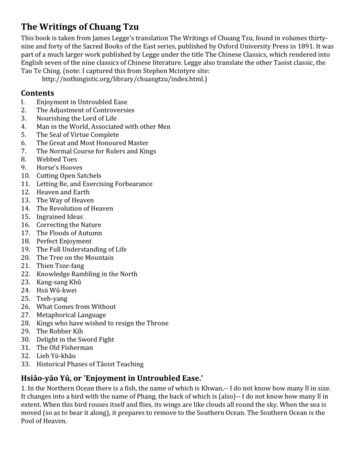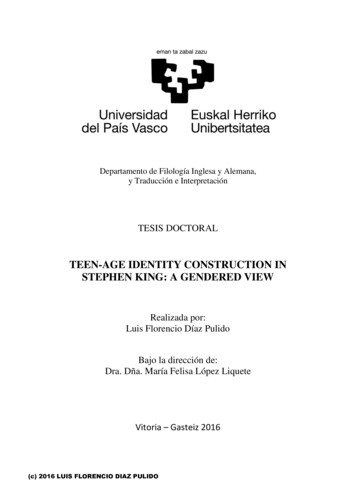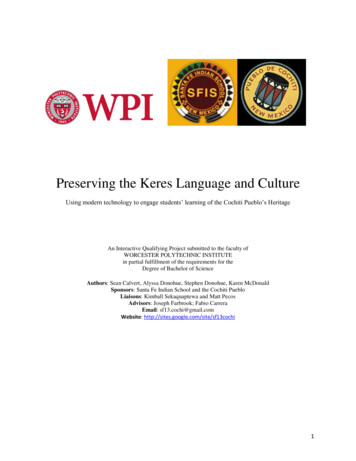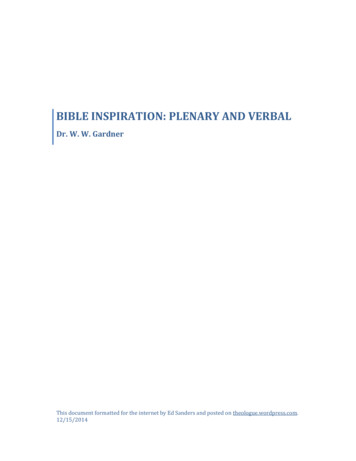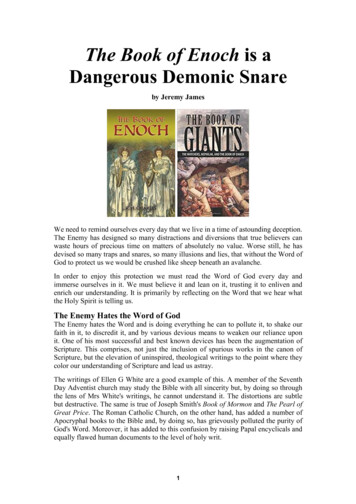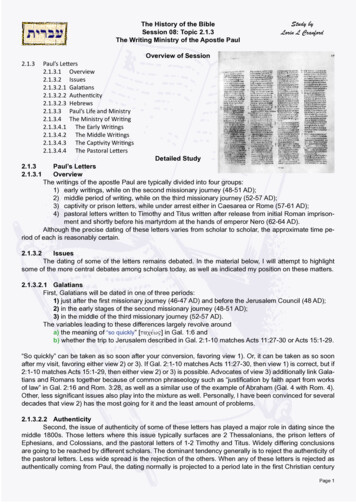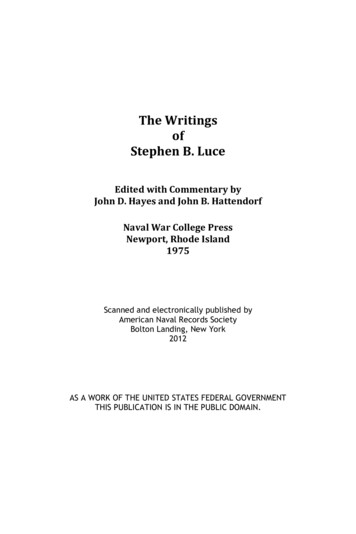
Transcription
The WritingsofStephen B. LuceEdited with Commentary byJohn D. Hayes and John B. HattendorfNaval War College PressNewport, Rhode Island1975Scanned and electronically published byAmerican Naval Records SocietyBolton Landing, New York2012AS A WORK OF THE UNITED STATES FEDERAL GOVERNMENTTHIS PUBLICATION IS IN THE PUBLIC DOMAIN.
THESTEPJohn D. Hayes
THE WRITINGSOFSTEPHEN B. LUCE
THE WRITINGSofSTEPHEN B. LUCEEdited with Commentary byJohn D. HayesandJohn B. HattendorfNaval War College PressNewport, Rhode Island1975
U.S. NAVAL WAR COLLEGEHISTORICAL MONOGRAPH SERIESNo.lContents may be cited consistent with conventional researchmethods. Reprinting in part or whole requires permission ofthe President, Naval War College.U.S. Naval War College, Newport, Rhode Island 02840First Edition
TABLE OF CONTENTSChapterPageIntroduction by Vice Admiral Julien J. LeBourgeois. ., -PrefaceIIIIIIIVTHE MAN: Stephen B. Luce (1827-1917)vvii1THE NAVAL WAR COLLEGE: An Address Delivered at theUnited States Naval War College, Narragansett Bay, R.I.,June Second, Nineteen Hundred and Three.37THE INTELLECTUAL FOCUS: On the Study of NavalWarfare as a Science45TACTICS AND HISTORY: On the Study of Naval History(Grand Tactics)69VLITERARY CRITIC: Three Book Reviews99VIADMINISTRATIVE REFORM: The Fleet109FLEET CONTROL: Naval Strategy125NAVAL BASES: The Navy and Its Needs147VIIVIIIIXANNOTATED BIBLIOGRAPHY OF LUCE'S WRITINGS,On Active Duty: 1862-1888XANNOTATED BIBLIOGRAPHY OF LUCE'S WRITINGS,In Retirement: 1889-1911XI163CHRONOLOGY OF LIFE AND WRITINGS201237APPENDIX-CATEGORY LISTING OF SIGNIFICANT ARTICLESCITED IN CHAPTERS IX AND X251INDEX253
ACKNOWLEDGEMENTThe publishing of this monograph was made possible by thegenerosity of the Naval War College Foundation, Inc. It is thisFoundation that so richly deserves the credit of preserving thewritten works of one of the U.S. Navy's most distinguishedofficers, Rear Admiral Stephen B. Luce, founding father of theU.S. Naval War College.
VINTRODUCTIONRear Admiral Hayes and Mr. Hattendorf have, through enexcellent portraitBleeckeroftheLuce,manand atimely comment on the intellectual heritage of the U.S. Navy.Here isa look at the individual perhaps most important inbridging the gap between the age of sailing ships and that ycontributed directly to the naval service but provided a focus,a direction, and a sounding board for the other great navalthinkers of the day—men like Alfred Thayer Mahan.WhileMahanwasthe naval strategist, an intellectual whomade a most dramatic impact on maritime strategy in his day,Luce was the activist who had the greatest influence on y A. Fiske wrote of him,tothink. he taught the Navy tothink about the Navy as a whole . he saw that a Navy inordertobegoodmustbedirectedasanentityalong apreconceived and definite line of strategy . . . "Luce and his associates were faced with a changing strategicenvironmentinwhichthechallengewastobuilda Navycapable of exercising the international potential of the UnitedStates.Incompetitorthinkerstoday'sandof enges.Luceandstrongthethe technological challenge of anindustrial revolution and a world steeped in sociological andpolitical change. Luce's experience should therefore provide ncerned with his profession.How very appropriate, then, that the authors have providedus with a look at Stephen B. Luce, a man who did so nificance for the Naval War College for Luce himself oncesaid withreferencetothecollege:"Letofficers who havecompleted their terms of sea service in their respective grades,come here for a two years course of study, not for discussion,but for study." The need for such study still exists. We at theNaval War College, like Luce, must focus our attention problems.thoughtButindealingthe processwithdoes notstop there. We must articulate these ideas, and here again wecan take a lesson from Luce. He was not only a thinker, but
VIhe was an active professional who was able to express hisideas in the forum of the day. He was a man true to hisbeliefs and committed to his profession; we are deeplyindebted to Rear Admiral Hayes and Mr. Hattendorf forsharing the works of this outstanding naval officer with us.JULIEN J. LEBOURGEOISVice Admiral, U.S. NavyPresident, Naval War College
vuPREFACEStephenB.Luce, certainly one of the U.S. Navy's greatofficers, is still chiefly known only for having founded the NavalWar College and for giving Alfred T. Mahan the chance to write hisfamous seapower series. As the readers of this volume will soonlearn, these were but two of his many far-reaching contributionsto his profession. The others were in such fields as education andadministration where fame and glory for a military or naval manare seldom gained.This is a volume of hero worship. The authors believe that theman of whom they have written is a hero in American navalhistory too long unrecognized. Luce was not the kind of man whowas interested in his own fame and fortune. He found completefulfillment in his career and felt little need to search for othermore material rewards. After he retired, several publishers wrote,encouraging him to write his memoirs for publication. InvariablyLuce refused. Characteristic of these exchanges must have beenthat in 1905 with Joseph B. Gilder, founder of The Critic and thena literary agent, who had written Luce on this subject. Unfortunately Luce's reply has not been found, but Gilder responded.It would be a national loss if the man who could write yourletter refusing to be an autobiographist, should refrain frombeing one!You say you have written yourself out. Is itpossible that the articles in which you have done so might begathered together and printed in book form? I don't believethe Japanese voyage is the only bit of autobiography youhave perpetrated in the process of "writing yourself out."1We have taken on the task that Luce himself refused and havegonea stepfurtherinattempting to identify all of Luce'spublished writings.Stephen B. Luce was not a hero in the popular sense, foralthough he belonged to the warrior trade, was proud of it, andspent his life preparing men for it, it was only in the preparationfor war that he achieved his right to fame: in education, training,and even in those more prosaic seas of endeavor of militarymanagement and naval organization. Luce was, above all, a leaderwho knew how to handle men, even to manage them in the lessrespected sense of the word. .B. Gilder (1858-1936) to Luce, 24 October 1905 in the Luce Papers, NavalHistorical Foundation Collection, on deposit in the Library of Congress. Hereafterabbreviated as Luce Papers, LC. See bibliography item 126 in chapter X.
VlllLuce was also a prolific writer. He wrote published material for50 of his 90 years, but he did so for periodicals and magazines. Assuch he has "joined his fellow magazinists in the limbo of theforgotten . . . The magazines are shifting sands."2His prepared writings, however, represent only one side of hisliterary effort. There are also his letters which portray Luce theman, but the presentation of these must await another time.Luce's letters were not so much chronicles as were those of hisrespected naval mentor Samuel F. Du Pont,3 but were letterswritten to get things done. In them he was "persistent in hisdemands and prolific with his suggestions,1'4 and whether hisletter was five lines or five pages, a recipient or a reader today, asthen, would seldom put it down before finishing.To Luce, writing was a means to an end, a direct vehicle foraccomplishing particularpurposes.He was an activist, not acontemplative, little interested in ideas for their own sake.The authors have endeavored to portray this man through hisprepared writings and have approached this task from threebearings. They offer:(1) A brief biographical summary and an essay on Luce.(2) A half dozen of his most representative and relevant, butnot necessarily his best, professional essays, edited in the currentform of the discipline.(3) Abstracts of his prepared articles: periodical essays, bookreviews, official reports, and contributions to newspapers with fullbibliographical citations to all of Luce's known writings.This is the means we have chosen to direct military officers,maritime people, historians, and writers, as well as practitionersand students intheareas of management and civil militaryrelations, even naval buffs, to find what we believe to be excellentguidance. Here, too, are some fine yarns, many of which camefrom the old men-of-warsmen Luce respected and loved.In the preparation of this volume, we have received the helpand support of many, all of whom should be acknowledged. Spaceconsiderations, however, allow only a few to be mentioned.Editors will not have it otherwise.2Frank L. Mott, A History of American Magazines, 5 vols. (Cambridge, Mass.:Harvard University Press, 1966-1968), vol. Ill, p. 16.J.D. Hayes, ed. Samuel Francis Du Pont, a Selection from His Civil War Letters, 3vols. (Ithaca, N.Y.: Cornell University Press, 1969).Donald N. Bigelow, William Conant Church and the Army and Navy Journal (NewYork: Columbia University Press, 1952), p. 209.
IXTo our editor, Comdr. Robert M. Laske, we make the firstbow. We shall always be in his debt.We are also deeply indebted to the late Mrs. Philip R. Alger,that grand ladyof Annapolis,Md.,whose productive yearsexceeded those of Luce and whom the senior partner of thiswriting team regarded as a good friend. From the Army family ofMeigs and the Navy family of Rodgers, she was a bridge whoattended the actual opening of the Naval War College in 1884. Herclear recollections about it and other happenings of those days inwhich Stephen B. Luce was involved were an incalculable aid toour efforts. How short are 90 years. She was the widow of PhilipR. Alger,5 editor of the United States Naval Institute Proceedingsfrom 1903 until his death in 1912, who we believe to be theoutstanding military and maritime editor in the history ofAmerican service periodicals. We consider the Alger years to havebeen the most dynamic in the Proceedings' century of publication.He controlled the periodical when Luce so needed it in his fightfor line officer direction within the Navy Department.At the Naval War College, Lt. (jg.) Craig L. Symonds of theStrategy Department faculty has generously offered sound andconstructive criticism. Anthony S. Nicolosi, Curator of the NavalHistorical Collection, has given staunch support and valuableassistance in a wide variety of ways since the very inception of thisproject. Both of these scholars have been thoroughly aware of ourproblems and have been personally most helpful. Professor JamesE.King,Director,Department of Advanced Research, underwhose cognizance this work was undertaken, generously allowedour work to be the first in his newly established department.Doris Maguire of Centerville, Md., who has unearthed so muchnew Mahan material, has found for us many Luce letters and leads.David A. Rosenberg of the University of Chicago helped withseveral difficult research problems.Many naval officers, historians, and graduate students will joinus in our thanks to the Naval History Division, Washington, D.C.In particular, we thank Dr. Dean AQard, Head, Operational RecordSection; Mr. W.B. Greenwood, Navy Department Librarian; andMrs. Agnes Hoover in the Curator's office for their enthusiasticaid.We thank the librarians who have helped us, notably at BrownUniversity, Providence,R.I., and especially at the Naval War5 Austin M. Knight, "Professor Philip Rounseville Alger, U.S. Navy—an Appreciation," United States Naval Institute Proceedings, vol. XXXVIII, March 1912, pp. 1-5.
College where Luce's own library is part of the collection. The WarCollege librarians not only aided us but put up with us and ourclutter blocking their stacks and aisles. We thank the staffs of allthe libraries that have helped us: Redwood Library, Newport, R.I.;G.W. Blunt White Library, Mystic Conn.; U.S. Coast GuardAcademy Library; U.S. Naval Academy Library; Rice UniversityLibrary; Navy Department Library; Rhode Island HistoricalSociety Library; Newport Historical Society; the Center forResearch Libraries, Chicago, 111.; Peabody Museum, Salem, Mass.;U.S. Army Military History Research Collection, Carlisle Barracks,Pa.; Marine Corps Historical Office, Washington, D.C.; and theLibrary of Congress.The job would never have been done were it not for theeditorial, composition, and layout assistance of Miss LeonoraMello, Mrs. Eleanor Silvia, Mrs. Mary DeMenezes, and Mrs. HelenLeBlanc of the Naval War College and our principal typists: Mrs.Sara E. McKee, Mrs. Ruth Saurette and Miss Genevieve Pietraszekof the Naval War College, Mrs. Audrey Amburgey of Manistee,Michigan and Mrs. Vernon Wild of Texas City, Texas.We thank our families for what they have done for us andwhich only we can know.Now we come to the happy, but nevertheless difficult task ofsincerely and enthusiasticallythanking Vice Adm.StansfieldTurner, USN, and the late Rear Adm. Richard W. Bates, USN(Ret.), President and founder Vice President of the Naval WarCollege Foundation. Without the personal interest of Turner andBates, the writings of Stephen B. Luce would have still remainedunknown.Finally, we are grateful to the people of the United Stateswhom, like Luce, we have had the honor to serve and who havemade all this possible through our active and retired pay.Stephen B. Luce, it has been a joy to know you; we do notapologize for the rhetoric that you taught us.JOHN D. HAYESJOHN B. HATTENDORFNaval War CollegeNewport, R.I.31 August 1973
1CHAPTER ITHE MAN: STEPHEN BLEECKER LUCE (1827-1917)IStephen B. Luce was active in the affairs of the United StatesNavy for 75 of his 90 years. He entered the Navy as a midshipmanin 1841, served on active duty through both the Mexican and CivilWars, and, after his retirement in 1889, continued to advise, towrite, and to influence naval men until his death in 1917.Throughout his career he never allowed himself or those to whomhe gave counsel to forget that the primary purpose of a navy wasto wage war, and regardless of how remote the possibility of war,the professional function of the officers was to study war and totrain their men for it. His insight, zeal, and untiring energy helpedbring about a transformation in American naval thought.Luce's most productive years were in the decades of the 1870;sand 1880's, an intellectual watershed and material nadir of theAmerican Navy. The contemporary British writer Oscar Wildenoted the situation in his satiric short story "The CantervilleGhost." In this story, Virginia, the American Ambassador's youngdaughter, advised the 300-year-old ghost of Sir Simon deCanterville that he should leave England and emigrate to Americafor his self-improvement. The ghost replied to the proposition:"I don't think I should like America.""I suppose because we have no ruins and curiosities," saidVirginia satirically."No ruins! No curiosities!" answered the ghost, "You haveyour Navy and your manners."1During the Civil War, the American Navy had achieved aremarkable reputation abroad. The battle between the Monitorand Merrimac had dramatically reinforced the impulse towardlrThe story was published in the collection entitled Lord Arthur Savile's Crime andOther Stories which first appeared in 1890. The quotation is from "Stories," The Worksof Oscar Wilde (London: Collins, n.d.), p. 327. For some recent detailed studies ofdefense matters in this period, see Kenneth Hagan, American Gunboat Diplomacy(Westport, Conn.: Greenwood, 1973); Lane C. Buhl, "Smooth Water Navy," Unpublished Ph.D. Dissertation, Harvard University, Cambridge, Mass., 1969; StanleySandier, "A Navy in Decay: Some Strategic Technological Results of Disarmament1865-69," Military Affairs, vol. XXXV, No. 4, December 1971, pp. 138-41; R. Seager II,"Ten Years Before Mahan: the Unofficial Case for the New Navy, 1880-1890,"Mississippi Valley Historical Review, vol. XL, No. 3, December 1953, pp. 491-512; B.F.Cooling, BenjaminFranklinCooling(Hamden,Conn.:Archon Books,Weigley, The American Way of War (New York: Macmillan, 1973).1973); R.F.
armored steamships among the European navies. In the years afterthe war, however, a general disarmament and lack of concern inCongress led to retrenchment in naval affairs. In general, theAmerican people turned their eyes and efforts to the developmentof the heartland. The rich farmlands of the West and the lure ofthe frontier seemed to offer far more potential than the sea whichhad been the basis for so much of early American development.The Navy and the merchant marine were neglected. The goldenage of American sail which Luce had seen in his youth was gone,and the technological innovation which had been applied duringthe Civil War had been suspended in naval affairs.The complex affairs of the 1870's and the 1880's in Americagave birth to a variety of elements, each of which had their impacton naval developments. The discovery of rich deposits of gold andsilver in Colorado and the Dakotas, the growth of railroads acrossthe continent, the rise of scientific agriculture, and the migrationof some 8 million people to the West between 1865 and 1890 ledto the disappearance of the American frontier. The outwardexpansion which for 25 years had absorbed the efforts of Americabegan to move in other directions. Based on more than just apsychological diversion from the land frontier, the stimulus forthis new expansion involved the growth of great corporations, theability to create capital at home and to borrow abroad. It involvedthe discovery and large-scale exploitation of such natural resourcesas iron ore, coal, natural gas, copper, gold, silver, and oil. Thepractical application of science and technology acted as a catalystto the processes of industry and transportation. This, in turn, wasaided by the availability of a relatively cheap labor supply, muchof it taken from the rising numbers of immigrants. All these manyfactors combined to increase the size of cities and factories, tostimulate the growth of the population, to modify social patterns,to widen the American intellectual and political outlook, and todevelop American nationalism.The Navy was very much a part of the general dynamismsweeping the American scene. Many of the factors seen on thebroader scale had their impact in naval development. Among otherinfluences, the Navy shared the revived application of technology,the inspiration of industrial techniques of organization andconstruction, the psychology of expansion, and the broadening ofintellectual horizons. While the Navy gave few outward signs ofchange before the late 1880's, the years after the Civil War were atime of ferment, preparation, and adaptation.Stephen B.Lucewas animportant figure in the Navy's
adjustment to the new age. He was able to carry forward some ofthe spirit of the sailing navy and to infuse it into the newlyrefurbished fleet. Unlike some of the younger men, he was able toperceive that the individuals who controlled and directed the newtechnologywerefarmoreimportantthan the weapons andmachines themselves. This perception provided the basis of hisapproach and contributed to the growing professionalism of theservice. Luce was one of the men who formed a dynamic linkbetween two major periods in our naval history: that of the sailand wooden ship with the navy of steam and steel.Stephen Bleecker Luce was born in Albany, N.Y., on 25 March1827, the second son of Vinal and Charlotte Bleecker Luce. Theoriginal Luce family came from England and settled in Martha'sVineyard, while his mother was from one of the old Dutchfamilies of New York. When he was 6, his father moved toWashington, D.C., to become a clerk in the Treasury Department.Stephen was appointed a midshipman in the Navy by PresidentMartin Van Buren in October 1841 at the age of 14. A few weekslater he left his home and dog, Pontius Pilate, to join theline-of-battleship North Carolina, then the receiving ship at NewYork.2His first 6 years at sea, as a midshipman, were spent in two ofthefinestmen-of-warof theline-of-battleship Columbus.day,thefrigate Congress andTwo of the very able officers heserved under became lifelong friends, David Dixon Porter andPercival Drayton. The Congress cruised both the Mediterraneanand the South American stations while Columbus took the youngmidshipman around the world, giving him a glimpse of Japan inthe first visitthat American men-of-war had made to thatcountry.3 This was followed by 6 months on the California coastduring the Mexican ademy, Luce received his earliest naval eduation at sea.Although the training was designed as only practical and vocational, the romance and adventure of the sea made a deepimpression on Luce's fertile mind. Today, there is little directevidence which remains to document for us the impact of theseearly influences, but one small item is striking in its connectionwith Luce's later career.2See his memoir of this experience in a piece he wrote for Youth's Companion afterretirement, "My First Ship," bibliography item 96.3See "Commodore Biddle's Visit to Japan," bibliography item 126.
Midshipman S.B. Luce, ca. 1841This photograph was taken about the time Luce wasassigned to his first ship, the ship of the line, U.S.S.North Carolina. In 1892, Luce wrote a memoir of hisexperiences on board that ship forYouth's Companion.Luce was warAfter six months on board,ranted midshipman and assigned to the frigate Congress for a cruise to the Mediterranean. During his firstcruise he began to collect the songs which eventuallybecame the basis for his book, Naval Songs, and todevelop a serious interest in history. A painting hoto: Newport, R.I., Historical Society
This clue to Luce's development was a rather plain book, anordinary-looking history of ancient Greece.4 This small volumehad special meaning for a midshipman sailing the Mediterraneanamong the very ghosts of ancient Greece and Rome. Recognizing ahistorical interest in a younger friend, one of Luce's shipmatesgave him the book so he could better appreciate some of the sightsthey had seen together. His shipmate inscribed it:With this little volume my Dear Luce, you can teach yourselfthe history of one of the most important epochs of theworld-when learning was in its infancy—and when educationwas the monopoly of a class. In giving it to you, I amanimated by a sincere wish for your welfare, and with aisincere desire to contribute my all in order to improve you.It would be gratifying to see you an officer in every sense ofthe word, and to accomplish this end, you must exercise yourenergy. With a view of leading your mind to a sense of itsduties, this book has been presented to you.5The book went with Luce as he sailed around the world inCongress. He brought it home, and it remained in his library forthe rest of his life. This present from a good friend, in itself, wasnothing unusual but the spirit of the gift had a profound effect onLuce's own life. The idea of teaching oneself and training the mindfor professional duties stayed with Luce in his later years andmarked his approach to education at the Naval War College.After spending two 3-year cruises at sea, Luce, with a numberof his contemporary midshipmen, was sent to the newly established Naval Academy. There he became a member of the secondclass to be sent to the school. These early classes little expected tofollow a finely prescribed curriculum. For the most part, themidshipmen were at Annapolis to review the information whichthey had learned from their seagoing mathematics professors andto prepare for promotion examinations.6 Luce spent the monthsbetween April 1848 and August 1849 studying for his examinations at Annapolis. As a passed midshipman, he then served, fromJohn Gillies, The History of Ancient Greece, Its Colonies and Conquests, from theEarliest Accounts Till the Division of the Macedonian Empire in the East, Including theHistory of Literature Philosophy, and the Fine Arts (Philadelphia: Wardle, 1835). Thisinscribed volume is in the Naval Historical Collection, Naval War College, Newport, R.I.5The inscription is signed, "By Your sincere friend, Robert C. Rogers. Congress,November 23d.'43."6See Park Benjamin, The United States Naval Academy (New York: Putnam, 1900),p. 186. The Naval Academy was established at Annapolis, Md., 10 October 1845.Midshipmen of the 1841 date were promoted to "passed-midshipmen" during the years1847, 1848, 1849, and 1850.
1849 to 1852, in the sloop-of-war Vandalia on the Pacific station.Fortunately,partof hispersonal journalfor thisperiod ispreserved among his papers. This ledger-size book gives a goodpicture of the young officer in Honolulu, San Francisco, and onboard ship and also provides an insight into his reading habits:Milton's Paradise Lost, Dickens7 Old Curiosity Shop, works ofShakespeare, and George Grote's 12-volume History of Greece. Inaddition, he read the Bible and knew it well. He became familiarwith the writing of Augustin Calmet, a French Biblical scholar, thesailor-poet Falconer, and authors such as Byron, Mommsen, andJames Fenimore Cooper. While reading these works, Luce provided for his own liberal arts education through broad reading,travel, and experience. As he became proficient in the practicalskills of his profession, Luce developed a sensitive appreciation forthe type and quality of men that the naval service required.Understandably, this viewpoint progressed with the scope of hispractical experience. In his early years, the young naval officernecessarilydealt withtheimmediateproblems around him:seamanship, gunnery, training, and the education required forofficers to lead and to organize men.Following his tour of duty in Vandalia came 4 years in theCoast Survey. For a brief period in 1853 he assisted Lt. James M.Gillis with calculations made from Gillis7 observations of Venusand Mars between 1849 and 1852. Luce was then assigned tovarious survey ships on the Atlantic coast where he continued togainexperienceinthescientificaspectsof his profession:astronomy, oceanography, cartography, and hydrography. On 7December1854,Stephenmarried a childhood friend,ElisaHenley, daughter of Commodore John C. Henley and a grandnieceof Martha uceserved as a lieutenant in thethenon the east coast of CentralAmerica. By this point in his career he had gained a wide varietyof experience from which to draw some sound observations abouthis profession and to outline the general direction of his futurecareer. In 1858 the 31-year-old officer wrote in his private journal:It is my opinion . . . that the navy should be re-organized. Letme commence with the officers and enumerate all that Iwould do. The present system of education for young navalcadets is one which will ultimately be serviceable to the Navy7Three children were born of the marriage: John Dandridge Henley Luce(1855-1921), Caroline (1857-1933), and Charlotte (1859-1946).
and highly beneficial to the country generally. Therefore, forthe future we entertain no fears at present, but I am sorry tosay that there are nowin our service, men who wear thenavy uniform, but who are totally deficient in education,both as officers and gentlemen, men who are not fit to beentrusted with the command of the meanest scow, or toassociate with an honest labourer of the lowest order. Letsuch as these be either dismissed or "laid upon the shelf77never again to do duty in any shape or way. It is such men asthese who abuse the little authority granted them, causinggreater restrictions placed upon their brother officers, andgainingfortheservicean unenviable name. . . . For theyounger officers, as I said before the present system ofeducation is good, but it is yet imperfect—it would be a goodplan to man a small brig with midshipmen, having some goodofficer in command. Let them commence and rig her, stowher holds, get the guns on board &c. and perform all theduties of a common sailor, they ought also, at as early an ageas is possible be given the charge of the deck, that they maylearn to have confidence in themselves.There is too little attention paid to the crews of our ships.They are not all Americans, this is one very great fault, theyare not allowed enough liberty, and are allow'd too muchgrog. Let these two very important items be well considered,let a system of punishment be arranged, the present is asabsurd as it is useless.Every ship in the service should have the same internal rulesand regulations, the same routine of duty, the same form forstation bills, the same gun exercises and in fact the sameeverything,theyshoulddifferas little as possible. TheEnglish Navy in some respects is a very good pattern. We onlyseem to copy their uniforms. Will nothing less than a war,effect a change for the better in the Navy?8These words are significant. They express an early perception ofmany of the problems to which Luce would devote his inistration.These fields of interest seem unusual when compared to those ofother officers at the time, but the choice was very much a productof his own experience.Intheyearsbeforethe Civil War, he developed a broad8S.B. Luce, "Private Journal," ca. 1858, Luce Papers, LC.
8perspective which encouraged in him a desire for further knowledge of literature and history. He developed an understanding ofmen and the ways in which they could be sympatheticallyhandled. Even at this early stage of his career, L
which Stephen B. Luce was involved were an incalculable aid to our efforts. How short are 90 years. She was the widow of Philip R. Alger,5 editor of the United States Naval Institute Proceedings from 1903 until his death in 1912, who we believe to be the outstanding military and maritime editor in the history of American service periodicals.



